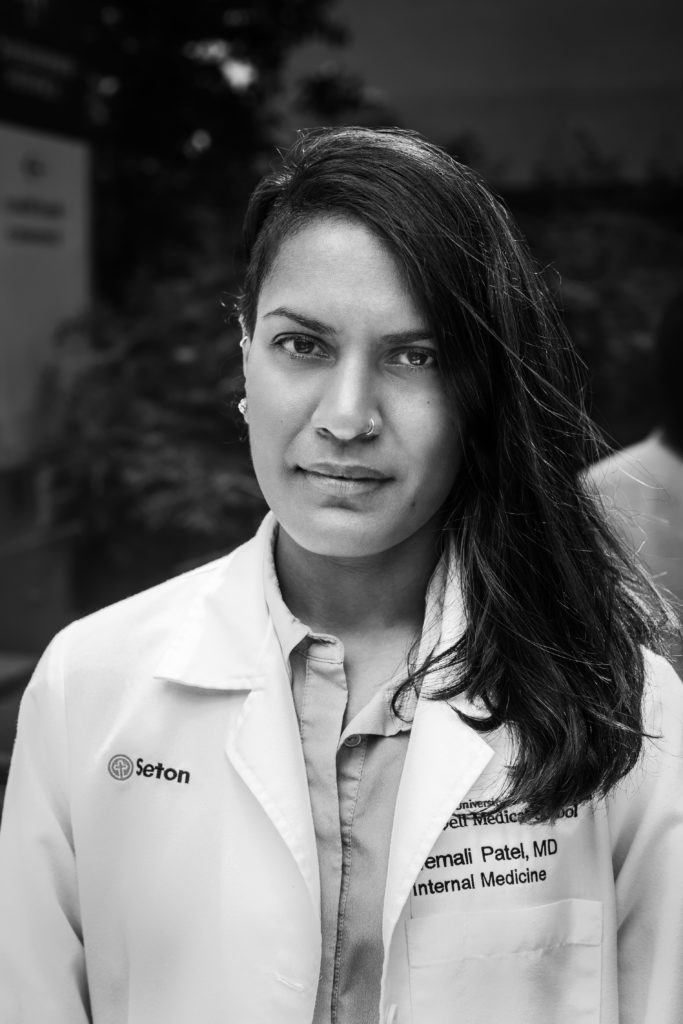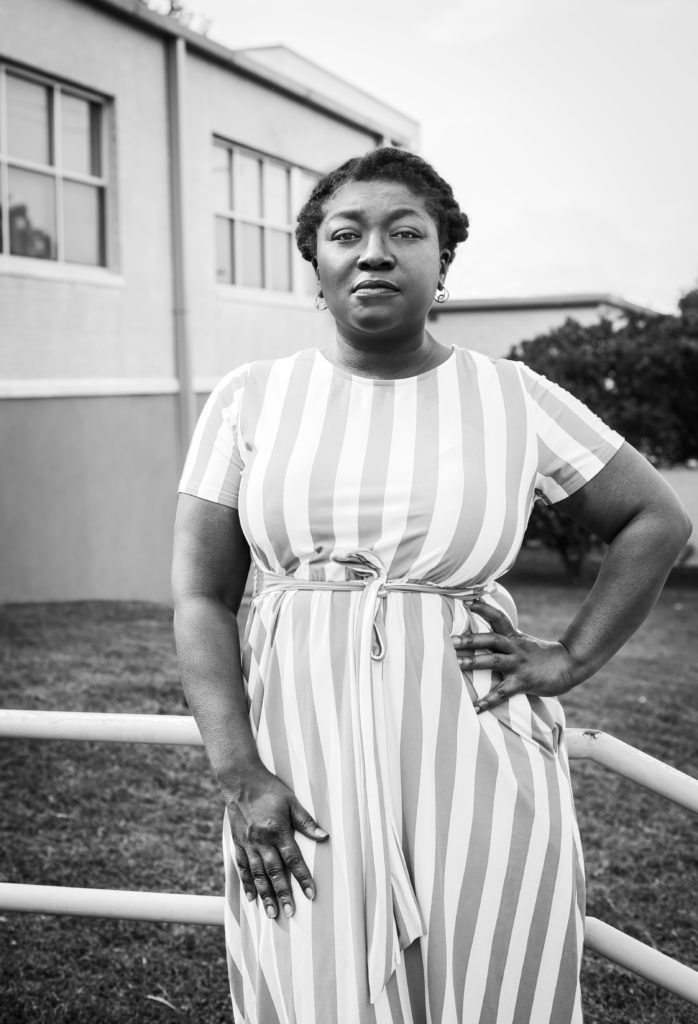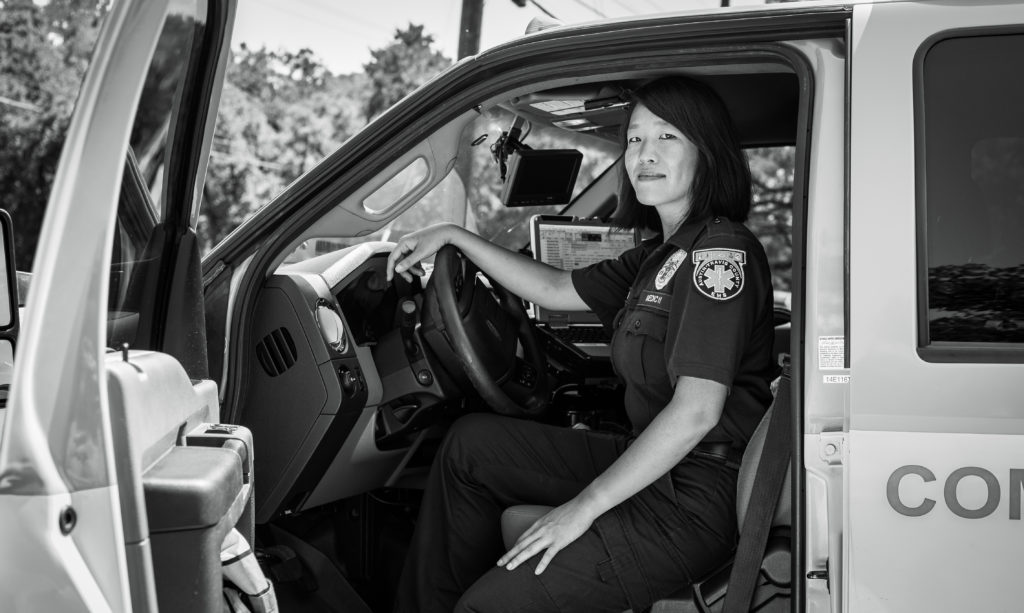In a tumultuous season of pandemic, Dr. Hemali Patel, Selena Xie and Natasha Harper-Madison are leaning into risk and leading the way forward.
By Courtney Runn, Photos by Kylie Birchfield
The cancelation of South by Southwest on March 6 was Austin’s canary in a coal mine. In the 116 days since, the city has been plunged into pandemic, protests, police brutality and polarization. Collectively, the city shares one overarching narrative but every Austinite has uniquely faced countless choices and risks, from the benign to the deadly.
People were suddenly faced with the question, what is worth the risk of contracting or spreading a virus without a cure? For every person, that answer has been different: For some, protesting racial injustice alongside thousands was a worthy risk; for others, a painfully lonely stretch of isolation was enough to send them seeking community despite a lingering virus; for many, reviving the economy or the simple desire for normalcy outweighed the risk of contagion.
Choosing whether to face risk is a privilege many don’t have. On the front lines of COVID-19 and racial injustice, risk is inherent to the job. Countless leaders and essential workers are making pivotal decisions and sacrifices; for them, risk isn’t a question, but a calling.

At Thanksgiving, Dr. Hemali Patel heard about a new virus across the world. Her sister’s friend had been traveling in Wuhan, China and returned with stories of a disease in the city. By December, Patel started seeing media reports about a novel coronavirus, but she wasn’t concerned.
In early March, Seattle emerged as a COVID-19 hotspot, alerting her that it could be a more concerning threat than she realized. On March 9, Italy announced a country-wide lockdown. A few weeks later, Patel was supposed to be on a plane to Kenya for a Dell Medical School conference; instead, she flew to New York City.
She landed in the city on Thursday, April 2, and by Saturday morning she was serving on a COVID-19 team, managing patient admissions and discharges. She and her colleague in the Department of Internal Medicine at the University of Texas at Austin Dell Medical School were among the first wave of health professionals to volunteer in New York’s overwhelmed hospitals.
Patel spent a week working at NYU Langone Health. She arrived at the hospital by 7 a.m. and left by 6 p.m., changing in and out of her scrubs as soon as she entered the hospital and showering immediately after getting back to her hotel. She was given one N95 mask and a face shield. “I work in the hospital all the time and I’ve never been so vigilant and aware of germs before,” she says. Walks to and from the hospital were “eerie,” without the normal cacophony of traffic and city commotion.
The best way she could describe her week is “controlled chaos.” Though her surroundings were grim and the work risky, she felt calm, which she credits to the comradery of her peers and the support of the city.
Patel is quick to hail nurses as heroes for tending to patients for longer stretches of times and risking exposure but feels a disconnect with deeming her own actions heroic.
“None of us think of ourselves as heroes,” she says. “I think we’re just doing what feels right to us and we’re fortunate enough to have these skills that can be utilized at a time like this and we just feel like it’s the right thing to do.”
Patel returned to Austin armed with information from her time in New York. She shared what she learned with her team at Dell Seton Medical Center and via a virtual town hall with Travis County Medical Society. Despite gaining more knowledge in New York, she says the entire experience has been “shaking” as a medical professional. To rely on observational and anecdotal medicine instead of concrete, evidence-based approaches is not what she’s trained to do but has become necessary to fight a virus still being researched.
“I think accepting that uncertainty and being able to be fluid and dynamic and change with the situation is probably one of the biggest things I’ve learned about myself during this time period,” she says.
As the country fixed its gaze on New York’s mounting cases, Selena Xie experienced the pandemic on the ground in Austin. As the president of the Austin EMS Association, she’s managed the city’s EMS response and led her team of medics through changing protocol.
In mid-February, she was focused on the local elections and the budget ramifications for her team. She remembers talks with colleagues about the new coronavirus, but it wasn’t a threat to Austin yet. In March, when a city council staffer suggested they might all be working from home soon, they both laughed at the thought. The next day, Xie traveled to Florida for an EMS conference where, ironically, several people attending tested positive. The day after she arrived back in Austin, SXSW was canceled.
Xie has remained in contact with paramedics in Seattle and New York to stay up to date with the best emergency protocol. At first, medics in Austin were only required to wear a surgical mask when making calls inside nursing homes. That quickly changed to require N95 masks and full gowns on every call. Xie estimates that since March, about one-fourth to one-third of all emergency calls have been related to a COVID-19 symptom. To avoid risking the health of both medics and concerned callers, a hotline was established to screen COVID-19 calls. If a caller truly did need medical attention, strict procedure was followed to minimize exposure.
Her unit was well stocked, dipping into a stockpile of unused masks from Ebola preparations. Local furniture store Austin Couch Potatoes redirected its machinery to produce personal protective equipment and donated gowns to Austin EMS. Xie spends her day on the phone, constantly reacting to new information, mitigating rumors and keeping her team informed. At the end of one day, she looked at her phone log to see more than 50 calls.
“It is true that many Austinites don’t know anybody in Austin who have had COVID-19 or have died from COVID-19 but that means the public health stuff is working so we should keep doing that,” Xie says. “…Us not having this huge outbreak is a sign of success.” (Since this interview, Texas has seen a spike in cases with a record number of reported cases and hospitalizations.)
Xie became interested in EMS after volunteering with Hurricane Katrina relief efforts. She’s now been in the field for eight years, a nurse for three years and the association’s president for a little more than one year. Becoming a medic immediately brings you to terms with daily risk, she says. With little pay and regular exposure to trauma, the turnover rate is high.
“Being a medic is really hard,” she says. “You can go from one call where someone’s baby has died to literally 10 minutes later…you go take care of someone else who stubbed their toe and wanted to go to the hospital.”
After a series of suicides several years ago, the unit established a peer support team and now offers access to counselors who specialize in PTSD. Xie is able to compartmentalize the more harrowing aspects of her job, which works for now, but she wonders what effect that will have on her in the future.
“I think in a lot of ways we’re trying, but in some really fundamental ways, we’re failing our folks,” she says.
COVID-19 has presented a new challenge to her team. Unlike the obvious personal risks associated with the job, her medics now have to grapple with spreading the virus to their families. The past few months have been a crash course in leadership for Xie as she’s adapted to new information while doing her best to keep her team safe. Apart from her full-time role as president, she also works part-time as an emergency-room nurse on the weekends, receiving the COVID-19 patients her medics deliver to the hospital.
In late May, she prepped her team for yet another challenge: manning protests. While responding to emergency calls at a protest is like any other emergency call in protocol, Xie says the heightened tension and charged atmosphere can lead to mistakes. Take extra water, sunscreen and medical gear, she reminded her team, and remember that people have the right to film.
“I’m glad to bear witness to everything that’s going on,” she says. “…Protesters wish they didn’t have to be there and wish that police brutality wasn’t real and I’m sure police also wish police brutality wasn’t real as well. But I’m glad to be able to help people.”

On June 4, Austin City Council convened for a virtual special session. The video call began like many other work Zoom meetings with repeated messages of, “You’re muted. We can’t hear you,” echoing feedback when members tried to use both computer and phone simultaneously, texting off camera and, most notably, disabled cameras.
City Council Member Natasha Harper-Madison, the lone Black member of the council, closed the opening remarks from council members with
an emotional plea to the one remaining disabled camera on the call: “We would be remiss to take one more minute of this meeting and not have our police chief not show his face. Chief Manley, I implore you…I want them to look at you when they [speak] and I want you to look at them. I implore you to please turn your camera on.”
He turned on his camera and for the following 10 hours, Austinites called in to voice their frustrations, primarily addressing Mayor Steve Adler and Police Chief Bryan Manley. Throughout the many hours of personal testimony, Harper-Madison emerged as the defining voice in the meeting. She was often in tears, at times rocking back and forth as she listened, briefly turning off her camera when she was too overcome by emotion. But her vulnerability did not preclude her strength to offer what many have not been able to: duality and humanity. Before the meeting paused for a break, she admitted she was struggling to stay on the call, calling it “brutal and painful,” but asked her colleagues and listeners to remember Manley is human, too. She encouraged everyone to spend the break away from their screen, practicing self-care
People took note of her comments—both holding Manley accountable to show his face and offering him grace after hours of calls for his resignation—leading Harper-Madison to tweet later that night, “Based on my notifications, I guess I made a little stir today.”
“People can both be under fire and held accountable but remain human,” she says. “The fragility of humanity is unilateral…I certainly wasn’t looking for any gold stars, I was just trying to remind everyone kindness is free. It may not be simple; it requires effort, but it doesn’t cost you anything.”
On June 11, City Council unanimously passed a series of resolutions targeting police reform and systemic racism, including a resolution authored by Harper-Madison to redirect police funds to social services and prohibit new officers from joining APD in the upcoming year.
She says a lot of what was passed had already been in the works for months. She’s careful to not speak on behalf of her colleagues or assume their motives in passing the resolutions, not crediting the protests as the impetus for the unanimous support. But she hopes this is a sign of more to come.
“I’m ready for meaningful, positive, substantive, long-lasting, transformative change,” she says. “…I listened to testimony that was gut wrenching and really difficult to listen to. I listened to peoples’ frustration and I listened to their anger and their demands for us as policymakers to do our jobs. I heard them holding us accountable and I take that very seriously.”
On a good night, Harper-Madison gets nine hours of sleep. But on most nights, she’s averaging between three and five. She jokes her biggest discovery during this season is that she requires “virtually no sleep.” But she’s also discovered the power in asking for help and in indulging in those nine hours when she needs it.
“Give yourself permission to do what you need to do to keep fighting,” she says. She’s taking her own advice, practicing self-care by playing with her kids, walking around her neighborhood, watching mindless TV, using deep-breathing exercises and talking to her therapist.
She’s also been journaling to record this moment in her life and in the country: “I was in a cyclone. I was a part of that period of history in 2020 when we got hit by a global pandemic [and]we addressed—really addressed—systemic racism and white supremacy…I often think about my legacy and think about how, if I continue to fight, and I fight with honor and integrity, then I think history will be kind to me.”


